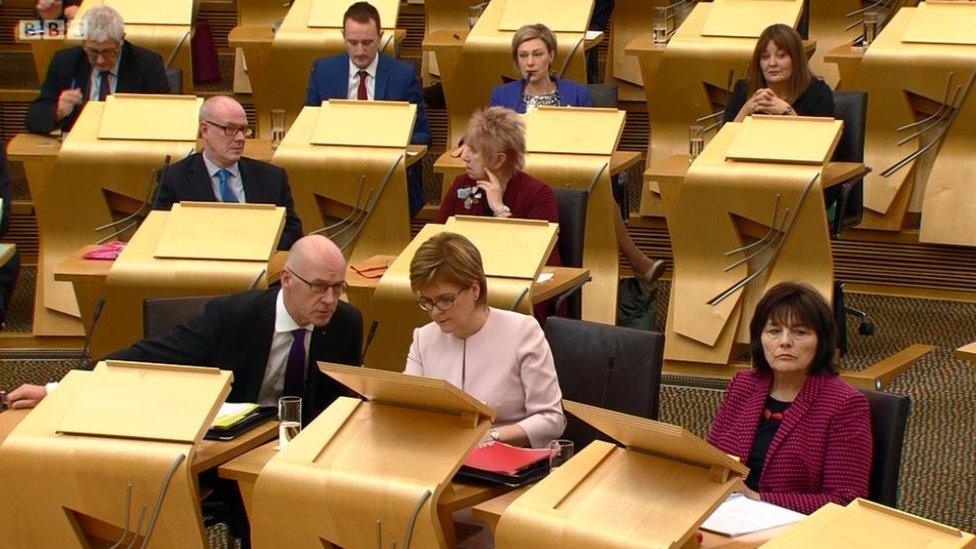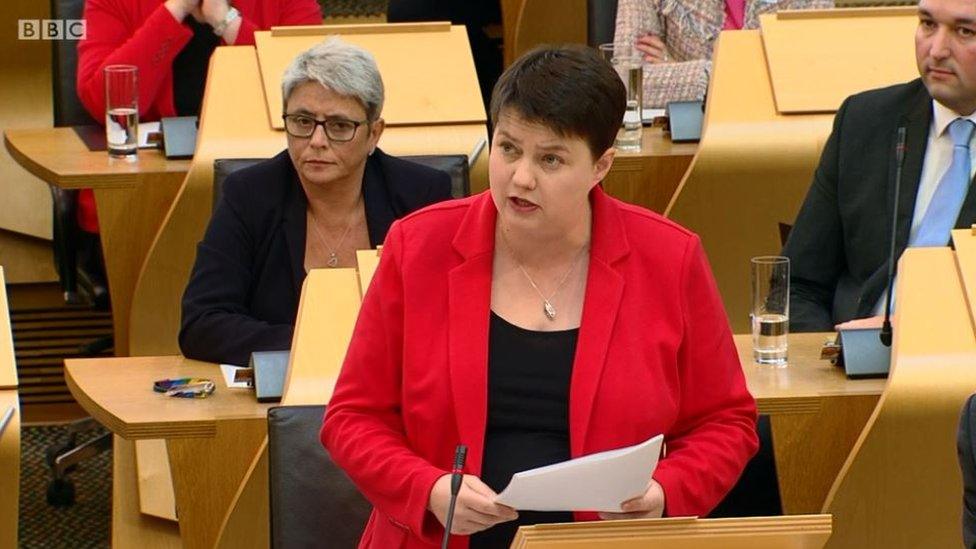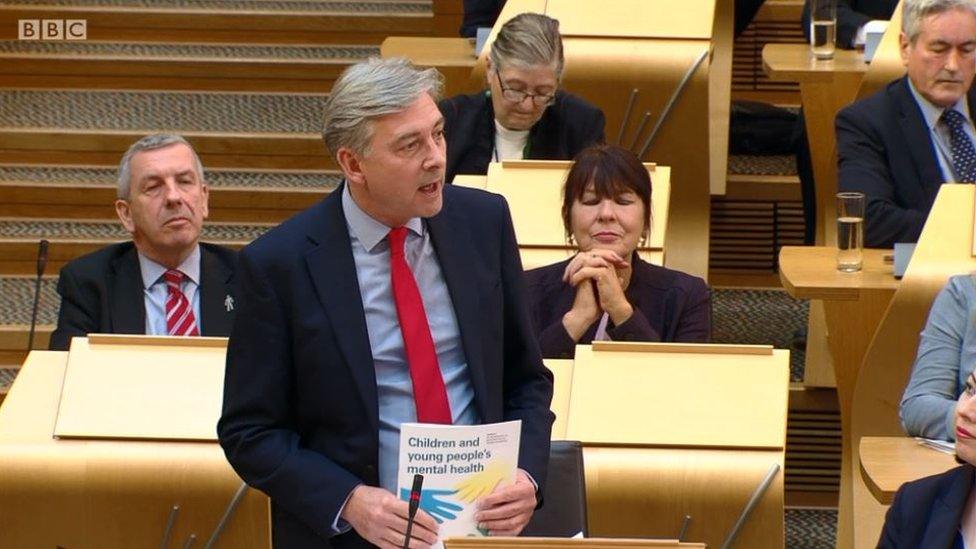Differences of opinion
- Published

Education Secretary John Swinney was on hand to help Nicola Sturgeon with her parliamentary tests
It was not, Nicola Sturgeon insisted, that the Educational Institute of Scotland were wrong. Perish the thought. Rather she and they had "a difference of opinion" over P1 testing.
Don't you just love that? Certainly, the Holyrood chamber did. Opposition MSPs guffawed and even a few Nationalists seemed to be stifling giggles.
Me, I think teachers should adopt the FM's tactic. "Elspeth, what's six times seven?" "Eh, 45 miss!" "Well, Elspeth, you and I are just going to have a difference of opinion over that."
Nicola Sturgeon's euphemistic dexterity is perhaps understandable. Her government is in a difficult place over this topic. She doesn't want to annoy teachers even more: she needs their co-operation.
But it's very different when it comes to her relations with Ruth Davidson. No linguistic machinations there.
She said the Conservative leader was a "shameless opportunist" who had displayed hypocrisy on a breath-taking scale. She added that Ms Davidson was only interested in inflicting defeat upon the SNP.
Why so? Ms Sturgeon drew attention to the Scottish Tory manifesto from the Holyrood election of 2016.
It had, she reminded us, welcomed the Scottish government's decision to reintroduce national testing in primary schools. After chiding ministers over the previous system, the manifesto offered several helpful suggestions as to how testing could be made more valid and functional.
The pledge in the Tory manifesto covered tests in P1, P4 and P7. And now? They have changed their minds and are agin the P1 tests, while still supporting the assessment of older pupils.

Ruth Davidson's Tories plan to force a symbolic vote on the future of P1 testing
Further, they will invite MSPs next Wednesday to vote against P1 testing by tabling a motion in opposition time at Holyrood.
The Tories note: "It will then be up to the nationalist government whether or not to accept the will of the Scottish Parliament."
Challenged on that point today by Willie Rennie of the Liberal Democrats, Ms Sturgeon sensibly took a metaphorical step to the side. Instead of reflecting upon the prospect of defeat, Ms Sturgeon said that ministers would defend their policy vigorously.
The FM appeared exasperated by the entire controversy - and not just the Tories. She noted that P1 pupils had previously been tested in 29 out of 32 Scottish local authority areas.
The system now ensured standardised assessments across Scotland. These were designed to measure how pupils were performing against Curriculum for Excellence parameters.
Further, they were not exams. Pupils would not be marked. Rather, the aim was to allow teachers to identify those who might be struggling a little - and thus requiring extra help. And those who were forging ahead and might benefit from more challenging material.
She read out supportive testimonies from selected teachers. Well aware, of course - and acknowledging as much - that other teachers and the EIS union have criticised the P1 assessments as burdensome and time-consuming.
We shall learn next Wednesday whether there is a Parliamentary majority for that critical view - and what response ministers will make, if they are defeated. They would not be obliged to cancel the tests instantly but they would, presumably, have to respond in some form.

Richard Leonard pressed the first minister on mental health services for young people
Another aspect of public policy provoked a challenge to the FM today. Labour's Richard Leonard pursued her rather effectively over the Audit Scotland report which suggested that mental health care for young people was lagging behind requirements.
Plainly, this is a hugely sensitive issue - and Ms Sturgeon responded, accordingly, with caution. She said her government had provided extra cash to the service - but that rising demand countered that to some extent.
The FM added that this enhanced demand was welcome in that it suggested the stigma associated with mental health issues in the past was lessening, liberating children and adolescents to seek help. But she readily conceded that further improvements were necessary.
In all, a day of challenges to established government policy and practice, amplified outside the chamber by news that nearly 1,800 women missed out on final screening checks for breast cancer. The Health Secretary Jeane Freeman has apologised and promised action.
But chamber questions from SNP backbenchers afforded Ms Sturgeon the opportunity to emphasise areas where, she argued, her administration had made a real difference.
For example, she said that money was being devoted to filling in rural gaps in mobile telephony cover: gaps left by the UK government which has reserved responsibility.
More, she noted that the first change in social security provision under devolved powers takes effect today. The payment of a Carers' Allowance Supplement, worth an extra £221 each year.
Lifting her eyes upwards just a little, Ms Sturgeon added that she looked forward to the day when Scotland would have full control over such matters.